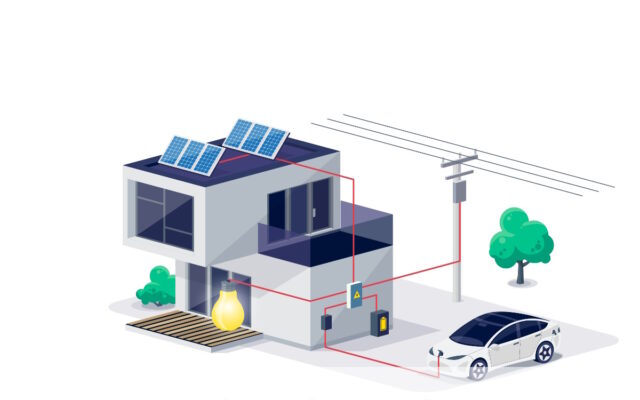The concept behind electric cars that act as home batteries is derived from the idea on bidirectional charging; this is also known as Vehicle-to-Home technology (V2H) or Vehicle-to-Grid technology (V2G).
This concept means that electric cars are not only able to receive electricity from the general power grid to charge, but they also have the ability to deliver electricity back to that same grid or even to your own home, at times when required.
Thanks to bidirectional charging, electric vehicles are transformed into versatile energy storage systems. Such systems can both absorb and release energy, depending on the situation and the owner’s needs.
Electric cars become not only an efficient means of transport, but also an important part of the larger power grid and home energy infrastructure. This opens the door to innovative ways of managing energy and enables more effective use of renewable energy sources.

Suppose you are considering using an electric car as a home battery, then it is good to know what this can bring. What are the biggest benefits of storing power in your electric car? We explain three benefits in relation to bi-directional charging.
One of the most obvious advantages of this concept is the ability to use excess energy stored in your electric car as emergency power during any power outage. The car can act as a reliable source of backup power for essential appliances in these situations.
Electric cars can store energy during off-peak hours, when electricity costs are low, and use that energy during peak hours, when rates are higher. This can result in significant savings on your energy bills.
Using electric cars as home batteries can reduce the load on the electricity grid, especially during peak hours. This can help the power grid operate more efficiently and reduce the demand for fossil fuels.
The disadvantages of using electric cars as home batteries are less well known; to date, not much research has been done on this concept. We highlight two disadvantages related to bidirectional charging.
Implementing bidirectional charging requires advanced technology and special equipment like a bidirectional charging system; this can increase installation costs. At the moment (September, 2023), not all electric cars are V2X (vehicle to everything, and therefore also V2G and V2H) capable. But this is likely to change soon.
The effect of bidirectional charging on the battery is not yet entirely clear. On the one hand, the battery seems to ‘wear out’ faster as a result of extra charging cycles. On the other hand, frequent use may actually contribute to longer battery life. The effects of this are being studied by several countries.
Using your electric car as a home battery requires some planning to ensure the battery is full in the evening. If you want to do this with self-generated solar energy, you need to be home during the day to charge the battery. You may have to top up the battery in the morning if you use it as a home battery, and this may incur costs such as EUR 0.60 per kWh when using a fast charger.
The future of electric cars as home batteries seems promising, however, some challenges still need to be overcome. With further technological developments and the growing acceptance of bidirectional charging, electric cars could play an even bigger role in the transition to renewable energy sources in the future.
The idea that your car is not just a means of transport, but also a home energy storage system, opens the door for a more decentralised and resilient energy system. Besides the financial benefits for individual users, it can also contribute to a greener and more sustainable future for all of us.
Conclusion: The concept of an electric car as a home battery is interesting and promises to contribute to a more sustainable future. Although this technology is still developing, it is certainly worth following its progress within the world of renewable energy. At present, however, it still poses a reasonable challenge because of the required planning if you wish to charge with solar power at home, possible additional costs and the accelerated depreciation of the battery. It is a promising idea that may become more feasible in the future as technology improves and infrastructure develops.
Want to know more about what Elfa can do for your business in terms of battery and lighting solutions? Our experts are ready to answer all your questions. Fill in the form below and we will get in touch with you as soon as possible.